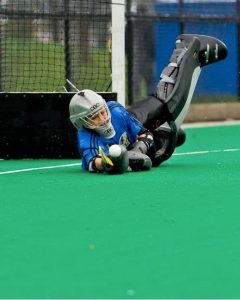
Bea Francisco is currently an MSc candidate in Dr Lara Boyd’s Brain Behaviour Laboratory at UBC. She holds an undergraduate degree in Kinesiology from UBC. During her undergraduate studies she represented both UBC and Team Canada as a field hockey goalkeeper. She was the 2010 and 2013 Canada West Field Hockey Goalkeeper of the Year and a four-time Academic All-Canadian.
During my time as a national team and varsity athlete, I spent countless hours of practice in order to improve skill execution and performance during competition. Factors such as practice schedules, sleep and nutrition were all considered in order to optimize our training and the learning of motor skills so that we could perform at our best. However, the ability to learn new motor skills (also termed motor learning) is highly important for functioning in everyday life. As we age, our ability to perform motor tasks declines, which can have a strong impact on activities of daily living. With an increased aging population, there is an urgent need to explore cost-effective rehabilitation strategies for motor impairments due to aging and neurological injury such as stroke.
Aerobic exercise may be a promising, cost-effective strategy for optimizing motor recovery. Research has shown that in young healthy adults, performing a single session of aerobic exercise closely in time with motor practice can “prime” the brain for motor learning. Importantly, acute aerobic exercise has also been shown to modulate neural circuits that are involved in the motor learning process in young healthy adults. However, whether these effects extend to an aging population is not yet understood.
My master’s project aims to investigate whether performing 20 minutes of moderate-intensity cycling exercise immediately prior to practicing a motor task can enhance motor learning in healthy older adults, compared to a resting condition. We are also using non-invasive brain stimulation to understand whether aerobic exercise modulates neural circuits underpinning the motor learning process in this population. This work will be an important first step towards the development of evidence-based guidelines regarding the role of exercise as a personalized neurorehabilitation strategy. If you want to learn more about this line of research in the Brain Behaviour Laboratory, please click here: http://brain.rehab.med.ubc.ca/research/current/exercise-and-motor-learning/